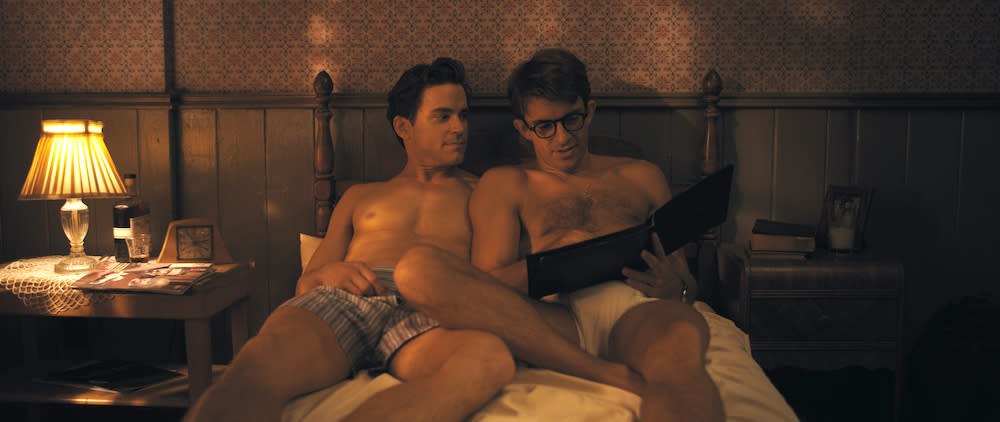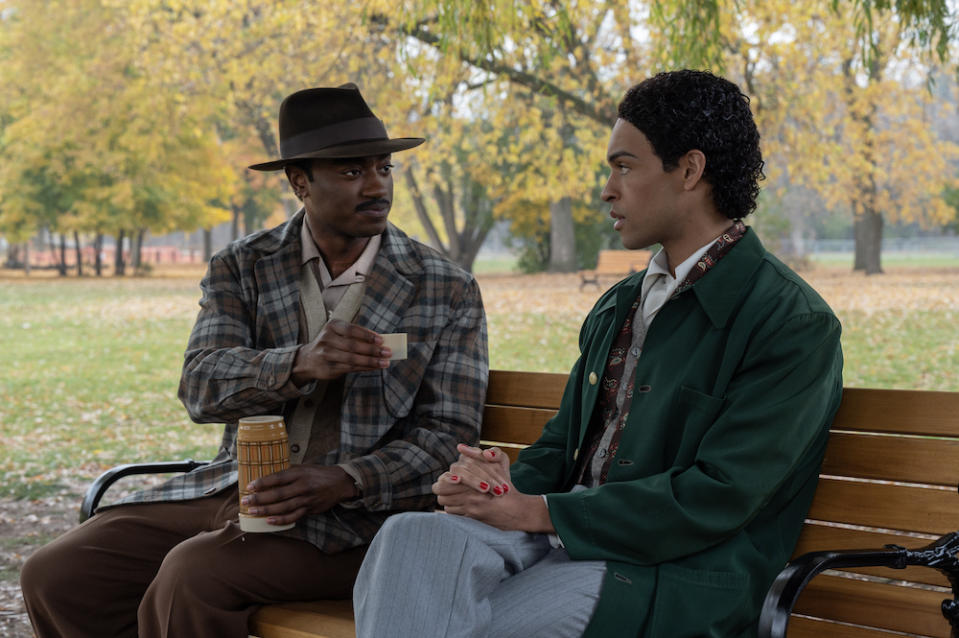‘Fellow Travelers’ Gracefully Guides a Steamy Romance Through Familiar History

From the opening verse of Steve Wonder’s “If It’s Magic” to its closing image of a teary remembrance framed by an American landmark, “Fellow Travelers” doesn’t bother disguising itself. The hallmarks of a tragic romance are as plain as the plastic nose on Senator Joseph McCarthy’s face, so Showtime’s eight-part limited series embraces its unmistakable genre staples, leaning into its historical framework to evoke added pathos for our paired protagonists. After all, if you’re telling a decades-spanning gay love story reaching from the Lavender Scare through the 1980s AIDS crisis, then you’re going to cross some trodden territory.
Like an austere companion piece to “Angels in America” by way of Douglas Sirk, creator and writer Ron Nyswaner’s unabashed melodrama doesn’t suffer by comparison (to either giant) as much as it carves its own gripping (if worn) path through earnestness, insight, and passion. Much of its power is a credit to its leads, Jonathan Bailey most notably, but Nyswaner navigates the dualities of his time-hopping story with finesse while infusing enough raw yearning to make audiences’ hearts hurt so good, from beginning to end.
More from IndieWire
Hawkins “Hawk” Fuller is celebrating. After years of “faithful service to the diplomatic core” (as he later puts it), the white, wealthy Stepford hubby (played by Matt Bomer) has landed a coveted overseas post with impending plans to jet off to paradise with his wife, Lucy (Allison Williams). But before he can rest easy in retirement, an old friend surfaces with news of a shared companion who’s just been dealt a difficult diagnosis. Tim (Bailey) may or may not be dying. It’s too soon to tell, but their once unfailing relationship, now fractured, coaxes Hawk out to San Francisco, where he hopes to heal a few enduring wounds before each man faces their fate.
From there, “Fellow Travelers” shifts between Hawk and Tim’s rocky reunion in the present (the late 1980s) and various stretches of their shared past. They first meet over drinks at Dwight D. Eisenhower’s 1952 election night party, where Hawk marvels at the bright-eyed and bushy-tailed McCarthy enthusiast who’s so lily white he steps up to the open bar and orders a glass of milk. A former candidate for priesthood, Tim has arrived in Washington D.C. filled with dreams backed by ideals. He believes in McCarthy’s quest to protect America from communism, he believes in a Catholic god of benevolent might, and he believes he can make a difference in people’s lives, even if it means sacrificing his own for the greater good.
Hawk admires the greater good and sacrifices plenty (often without realizing it), but belief isn’t part of his make-up. He sees his job — as the right-hand man to U.S. Senator Wesley Smith (Linus Roache) — as a guardian, of sorts; protecting the well-meaning politician from his own good intentions. Hawk likes the freedom offered by power, be it his boss’ dissenting position on McCarthy’s crusading Congressional subcommittee, his own “bulletproof” status as a war hero, or the upward mobility available to the most ruthless political operatives. Yes, Hawk could allow Smith to speak out against McCarthy’s increasingly tyrannical practices, but without public support, those wise words would only lessen their status, and Hawk can’t have that — for reasons beyond professional ambition.

That fateful election night, when Hawk is bowled over by Tim, he’s not merely struck by the new kid in town’s clear-eyed exuberance. Hawk wants Tim, and proceeds to court him — with the utmost discretion in public and with brazen command in private. Their affair, at first, is carnal and raw. Hawk tries to treat his new beau just like the “tricks” he picks up in public men’s rooms: getting satisfaction without a whiff of intimacy. Hawk does this to protect himself, and Tim mostly understands; if anyone found out about them, they’d never work in D.C. again — and worse, as is made excruciatingly clear when their colleagues are caught during McCarthy, Roy Cohn (Will Brill), and the entire Eisenhower administration’s years-long witch hunt.
Nyswaner is delicate and precise in depicting Hawk and Tim’s romantic evolution. Sex scenes that began as blunt, intense encounters develop into tender, telling moments before turning back again and advancing with added nuance. “Fellow Travelers” is sure to enrage the silly, conservative-minded crowd advocating for sexless cinema, but it serves as a powerful example of how revealing such scenes can be, beyond the obvious. Hawk and Tim can only disclose their most naked wants and needs while behind closed doors, and without these vivid depictions of their sex life, audiences would be missing out on the urgent, overpowering nature of their desire — a desire that motivates choices beyond their relationship status, as the historical drama surrounding their ardor so obviously denotes.
Bomer and Bailey deserve all the credit coming their way for building such palpable chemistry. From their first interaction onward, they share a charge that never dissipates, even as their relationship grows complicated and cracked. Still, unlike romances that wither on the vine whenever their leads pry themselves off each other, “Fellow Travelers” holds its grip on the audience throughout its eight-hour run. Bomer’s stoic restraint proves his strongest attribute. Hawk, quite literally, is cleaner cut than a Kennedy (John makes a brief appearance), and Bomer wears his classic WASP exterior like a slightly too-snug Halloween costume. He can smile for the cameras, but there’s something tugging at the corners, making it clear to discerning eyes that he can’t wait to discard his mask. The only problem is the mold doesn’t come off so easily, leaving Hawk trapped by a hetero-normative character of his own creation.
Bailey, meanwhile, is an exposed nerve. Tim loses his hero, his faith, and his companion — most more than once. The cold, hard world just keeps smacking him in the face, but the same starry-eyed hope that hurts Tim is also what saves him, which makes it all the more believable that he’d keep circling back to politics, to religion, and to Hawk, decade after decade. But Bailey doesn’t treat each cycle the same way. He matures Tim, hardens him, and approaches each familiar temptation with fresh eyes. There are sparse few moments when his abandon can feel overblown (just as there are rare instances when Bomer’s austerity is a little too stolid), but it’s all so well-defined within the character that you never feel like you’re watching an Emmy audition reel.
“Fellow Travelers” earns its rousing moments, which double as a shield for a handful of shortcomings. Inclusive, involving B-plots centered on supporting characters like Hawk’s secretary, Mary (Erin Neufer), and Marcus (Jelani Alladin) — a Black, gay reporter who struggles to marry his hardened racial identity with the sissifying assumptions cast on his sexuality — are well-realized, if not always a good fit with what’s going on between the main players. Pilot director Daniel Minahan (“Deadwood: The Movie”), along with Uta Briesewitz (“The Deuce”) and others, capture beautiful compositions through dramatic lighting and patient close-ups, though certain scenes begged for wider framings and richer mise en scene to better mirror the scope of this epic romance. And if you can’t stop comparing “Fellow Travelers” to the untouchable “Angels in America,” well, the moments of explicit exposition and convenient overlaps may induce a few eye-rolls.
“If it’s magic, then why can’t it be everlasting?” Wonder sings in the series’ opening moments. When it comes to gay lovers who meet in the ’50s, you may already know the answer. But “Fellow Travelers” understands that epic romances can’t be confined by time. They create their own magic.
Grade: B+
“Fellow Travelers” premieres Friday, October 27 on Paramount+ with Showtime and Sunday, October 29 on Showtime’s linear channels. New episodes will be released weekly through the finale on December 17.
Best of IndieWire
Sign up for Indiewire's Newsletter. For the latest news, follow us on Facebook, Twitter, and Instagram.

